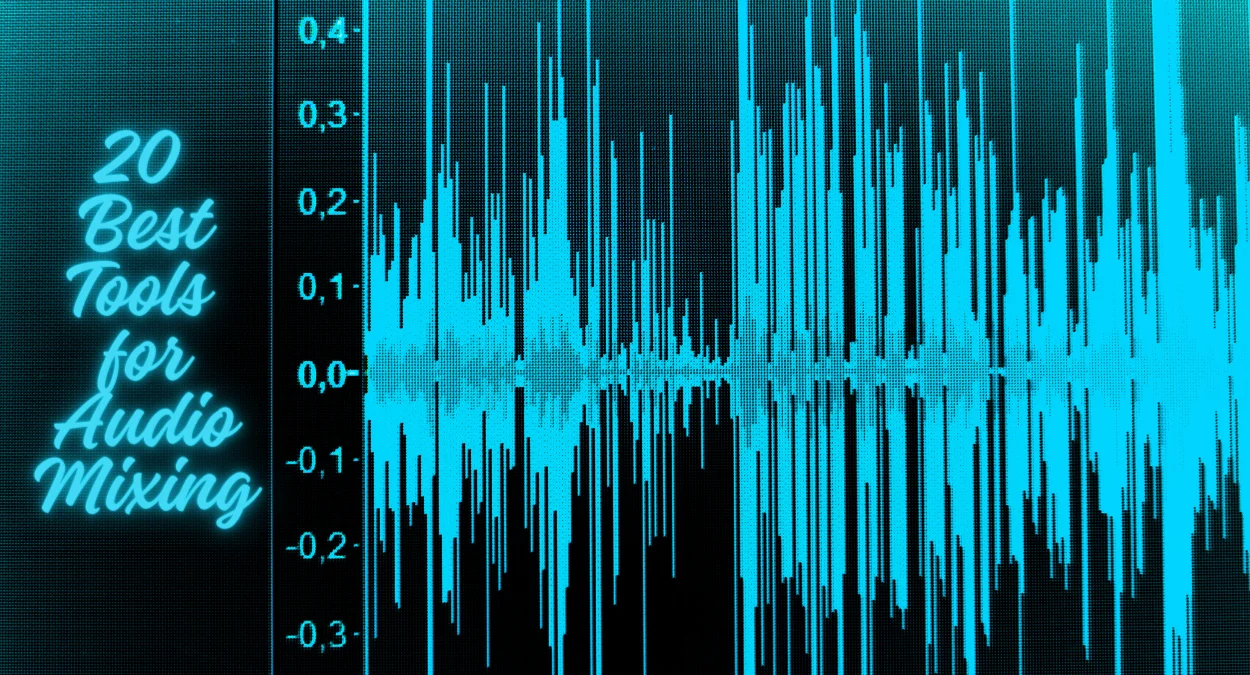20 Best Tools for Audio Mixing
Introduction:
When it comes to audio mixing, having the right tools at your disposal can make all the difference in achieving a polished and professional sound. In this article, we will explore the top 20 tools that have garnered acclaim in the industry for their exceptional mixing capabilities.
Table of Contents
20 Best tools for Audio Mixing
From renowned digital audio workstations (DAWs) to powerful plugins and hardware units, these tools offer a range of features and functionalities to cater to the needs of both aspiring and seasoned audio engineers.
Discover the tools that will take your mixes to the next level, whether you’re working on music production, film scoring, podcasting, or any other audio endeavor. Get ready to elevate your sound and unlock your creative potential with these best-in-class audio mixing tools.
20 Best Tools for Audio Mixing: Elevate Your Sound with Professional-grade Mixing Capabilities
1. LANDR: AI-driven online audio mastering tool that automatically enhances the sound quality of your music tracks.
2. iZotope RX: Advanced audio repair software that uses AI algorithms to remove noise, clicks, and other imperfections from audio recordings.
3. Melodyne: AI-powered pitch correction software that allows precise editing of vocals and instruments.
4. Accusonus ERA Bundle: AI-based audio plugins that offer noise reduction, de-essing, plosive removal, and voice leveling capabilities.
5. Waves Abbey Road Studio 3: AI-enhanced virtual mixing plugin that recreates the acoustic environment of Abbey Road Studios for a more immersive mixing experience.
6. Sonible Smart:EQ 3: Intelligent equalizer plugin that uses AI to analyze audio tracks and suggest optimal EQ settings.
7. Zynaptiq UNMIX::DRUMS: AI-powered audio plugin that separates drum tracks from mixed music, allowing for individual processing and remixing.
8. Audionamix XTRAX STEMS: AI-driven software that automatically separates vocals, drums, and music from mixed audio tracks, providing stems for further manipulation.
9. MasteringBOX: AI-based online mastering platform that delivers professional-sounding audio masters with just a few clicks.
10. Klevgrand Brusfri: AI-powered noise reduction plugin that intelligently reduces unwanted noise in audio recordings while preserving the overall sound quality.
1. Pro Tools: Industry-standard digital audio workstation (DAW) that offers comprehensive mixing capabilities, advanced plugins, and intuitive workflows.
2. Ableton Live: Popular DAW with powerful mixing tools, flexible routing options, and real-time effects processing.
3. Logic Pro X: Apple’s professional DAW with a robust mixing environment, extensive plugin collection, and seamless integration with other Apple products.
4. Cubase: Feature-rich DAW that provides precise mixing controls, advanced automation, and a wide range of built-in effects and plugins.
5. Studio One: User-friendly DAW with an intuitive mixing console, drag-and-drop functionality, and a vast library of effects and virtual instruments.
6. Waves SSL 4000 Collection: Plugin bundle that emulates the legendary SSL 4000 console, offering a classic analog sound for mixing.
7. FabFilter Pro-Q 3: High-quality EQ plugin with a clean and intuitive interface, precise controls, and advanced features like dynamic EQ and mid/side processing.
8. Universal Audio UAD-2 Satellite: External DSP accelerator that allows access to a wide range of high-quality analog emulation plugins for mixing.
9. Soundtoys 5: Comprehensive collection of creative and unique effects plugins that can add character and depth to your mixes.
10. SSL G-Master Buss Compressor: Classic SSL bus compressor plugin known for its ability to glue a mix together and add warmth and punch.
These tools are widely used in the industry and offer a combination of professional features, usability, and sonic quality to help you achieve top-notch audio mixes.
FAQs
1. What are the key factors to consider when choosing audio mixing tools?
When selecting audio mixing tools, it’s important to consider factors such as compatibility with your operating system, the specific features and functionalities you require, the learning curve involved, and your budget.
2. Can these tools be used by beginners or are they more suitable for professionals?
Many of the tools mentioned in this article cater to a wide range of users, from beginners to professionals. Some may have more advanced features that professionals can take advantage of, but they are generally designed to be user-friendly and accessible for users at different skill levels.
3. Are these tools compatible with all major DAWs?
Most of the tools mentioned in the article are compatible with popular digital audio workstations (DAWs) such as Pro Tools, Ableton Live, Logic Pro, Cubase, and Studio One. However, it’s always recommended to check the system requirements and compatibility information provided by the tool’s manufacturer.
4. Do these tools require any additional hardware or software?
The majority of the tools mentioned are software-based and can be used standalone within your DAW. However, some plugins may require a compatible audio interface or external DSP accelerator for optimal performance. It’s important to review the specific requirements of each tool before making a purchase.
5. Can these tools be used for mixing different genres of music?
Absolutely! The tools listed in the article are versatile and can be used for mixing a wide range of musical genres, including pop, rock, electronic, hip-hop, jazz, classical, and more. The choice of tools ultimately depends on your specific mixing needs and personal preferences.
6. Are there any free alternatives available?
While some of the tools mentioned offer free versions or trial periods, the majority are premium tools that may require a purchase or subscription. However, there are also free audio mixing plugins and software available that can still provide excellent results, albeit with fewer features and limitations.
7. Can these tools be used for other audio projects besides music mixing?
Absolutely! These tools can be utilized for various audio projects beyond music mixing, including podcast editing, sound design for film and television, audio post-production, voice-over work, and more. Their versatility makes them valuable assets for a wide range of audio-related endeavors.
Remember to do thorough research and evaluate your specific needs to determine which tools are the best fit for your audio mixing requirements.
https://5doller.com/free-online-tools/
Boost Productivity And Success With 20 AI Tools For Video Editing




Pingback: Top 10 Free Tools for Text, MP3, and Translation
Pingback: 7 Digital Marketing Free Tools - One Digital Era
Pingback: 11 Best Marketing Tools to Supercharge Your Campaigns